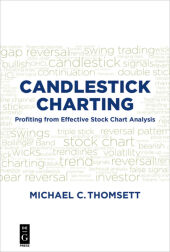 Neuerscheinungen 2017Stand: 2020-02-01 |
Schnellsuche
ISBN/Stichwort/Autor
|
Herderstraße 10
10625 Berlin
Tel.: 030 315 714 16
Fax 030 315 714 14
info@buchspektrum.de |

Michael Thomsett
Candlestick Charting
Profiting from Effective Stock Chart Analysis
2017. XII, 308 S. 50 b/w ill., 40 b/w tbl. 230 mm
Verlag/Jahr: DE GRUYTER 2017
ISBN: 1-501-51580-2 (1501515802)
Neue ISBN: 978-1-501-51580-4 (9781501515804)
Preis und Lieferzeit: Bitte klicken
Investors and traders seek methods to identify reversal and continuation to better time their trades. This applies for virtually everyone, whether employing a swing trading strategy, engaging in options trading, or timing entry and exit to spot bull and bear reversals. Key signals are found in the dozens of candlesticks, combined with technical signals such as gaps and moves outside of the trading range; size of wicks (shadows) and size of real bodies. The science of candlestick analysis has a proven track record not only from its inception in 17th century Japan, but today as well.
This book explains and demonstrates candlestick signals, including both the appearance of each but in context on an actual stock chart. It further takes the reader through the rationale of reversal and continuation signals and demonstrates the crucial importance of confirmation (in the form of other candlesticks, traditional technical signals, volume, momentum and moving averages).
Michael C. Thomsett is a market expert, author, speaker and coach. His many books include Mathematics of Options , Real Estate Investor´s Pocket Calculator , and A Technical Approach to Trend Analysis .
A video of the author titled "Candlesticks for Option Timing" can be found here:
https://www.youtube.com/watch?v=IItH6OLh7TI
Chapter 1: The Basic Candlestick 1
The Origin and Meaning of the Candlestick 2
Strengths and Weaknesses of Candlesticks 7
Paper Trading as a Testing Ground 12
The Skills Every Trader Needs 15
Candlesticks: General Observations Concerning Their Use 19
Expanding the Information Pool Effectively 22
Chapter 2: Single Stick Signs 27
Uptrends and Downtrends 28
The Significance of a Candlestick´s Shape 31
Variations on the Bullish Long Candlestick 33
The Mistake Pattern 35
The Spinning Top, Hanging Man, and Hammer 41
Line Signals 44
The Significance of Tails 45
Chapter 3: Double Stick Moves 49
Two Reversal Moves: Engulfing and Harami 50
More Reversals: The Inverted Hammer and Doji Star 56
Gaps and Lines 60
Neck Lines, Crows, and Rabbits 68
Reversal and Confirming Moves-Relative Values 78
Chapter 4: Complex Stick Patterns 81
Reversal Trend Change Patterns 82
Inside and Outside Formations 88
Reversal Stars and Abandoned Babies 91
Line and Gap Continuation Signals 95
Tower Tops and Bottoms 105
Chapter 5: Reversal and Continuation Pattern Analysis 109
Strong Top and Bottom Signals 111
Stars, Kicks, Swallows, and Sandwiches 117
Matching and Star Reversals 126
Ladders and "Major" Reversals 130
Sakata´s Five Methods 134
Price Patterns with Low Reliability 142
Strong Price Line Reversals 150
Recognizing the False Signal 165
Chapter 6: Volume and Volatility 169
Volume as a Price Indicator 169
Volume Indicators 174
Testing Price Volatility 183
Triangles and Wedges 185
Chapter 7: Buy and Sell Set-Up Signals 193
Price Spikes and Reaction Swings 196
Percentage Swing Systems 200
Short-Term Gapping Behavior 202
Anticipating the Trend During Consolidation 206
The False Indicator 210
Support and Resistance in the Swing Trade 214
Chapter 8: Swing Trading with Candlesticks 219
A Swing Trading Overview 220
Quantifying Price Movement with Candlesticks 223
The Importance of Convergence and Divergence 226
Primary Trends and Candlestick-Based Entry or Exit 230
Set-Up Criteria and Action Points 234
Selling Short in Swing Trades 239
Chapter 9: Spotting Trends and Using Trendlines 243
Identifying the Trendline 244
Trendlines and Confirmation Signals 249
Applying Moving Averages to Candlestick Analysis 252
The Channel Line 254
Chapter 10: Technical Indicators 257
The Value of Confirmation 258
A Review: Technical Analysis Basics 261
The Significance of Gaps 264
A Framework for Interpretation: Support and Resistance 267
Overbought and Oversold Indicators 270
Relative Strength Index (RSI) 270
Stochastics 272
MACD 273
Bollinger Bands 274
The Potential of Candlestick Signals 278
Glossary 281
Index 297


